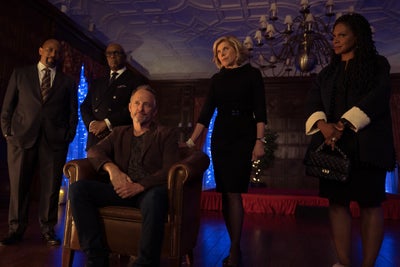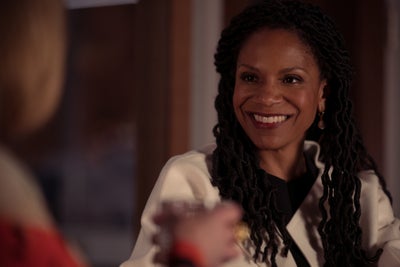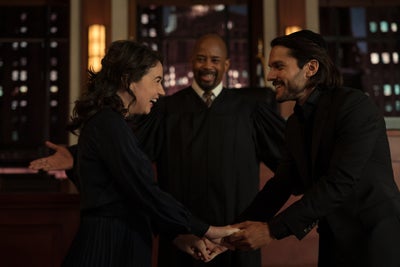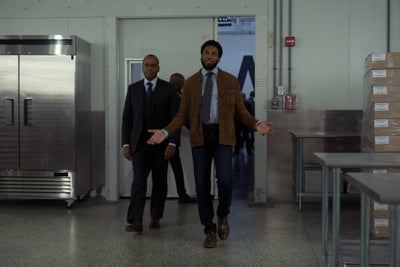
[ad_1]
If there is any show on television that genuinely captures the feeling of the immediate post-Obama years, it might be The Good Fight. The series, a spin-off of the long-running CBS drama The Good Wife, premiered in February 2017 and follows the work of a fictional Chicago-based law firm. It begins with a shot of Christine Baranski’s Diane Lockhart watching the inauguration of Donald Trump, awestruck. It’s a critical point at which both she and the nation plunge into a sort of freefall, with Lockhart suddenly losing all her savings to a largescale financial scam and deciding to exit her role as partner to instead work for an all-Black firm.
The events of the series closely mirror narratives that have shaped our social and political environment in the aftermath of Trump’s rise to power, exploring issues of fake news, white supremacy, #MeToo, the pandemic, and the George Floyd protests, among a long list of other hot-button topics throughout its six seasons. The show’s creators Robert and Michelle King were game to contend with any and all of what Americans were facing through a lens that was sometimes moving and heartfelt, sometimes more arch and satirical. With such political pandemonium dominating headlines every day, there was always plenty to work with, and they didn’t find themselves shying away from much.

“I very much liked how we put in the weirder things of the Trump administration, like the Pee Tape, and weaved it into the show,” Robert says. “We thought in a creative way. This year, The Collective, which was this activist group trying to address issues of race today — it was fictionalized obviously, but I liked how it kind of bounced off ‘what do you do when you live in a world with white supremacists?’ I mean, how do you address that on a day-to-day basis?”
Focusing on an African American firm made for a more diverse picture of a legal series than audiences had been given in the past. The Good Fight’s Black characters were partners, judges, complex figures with their own storylines that didn’t simply orbit Baranski’s Lockhart. Broadway legend Audra McDonald stepped into a series lead role as Liz Reddick starting in season two and found herself struck not only by the emphasis the series placed on Black characters, but also by the storytelling around characters of a certain age.
“I’m proud of the representation off screen as well as on screen,” McDonald tells ESSENCE. “We had a very diverse writing staff and of course the stories that we delved into, the fact that the show centered a Black law firm. How many of those are there? And with Liz and Diane, heading up the firm, the representation of women in power — not just young women, but older women; I’m in my fifties, Christine just turned 70. We’re the leads. I sound like I’m buttering myself up, but it’s showing that women can be smart, talented, sexy, have full romantic lives, and we weren’t just these young little starlets. We were doing that in our middle age and showing it on television. I hope to see more of that.”

Michael Boatman — who plays series regular Julius Cain — is a network TV veteran, with roles on Spin City, Law & Order, and Madam Secretary throughout over 30 years in the business. In the context of his career, the legacy of The Good Fight is clear: From the series mainstays to the guest stars to the storylines, it’s the Blackest show he’s been on.
“One of my favorite stories is about a scene we were doing in the bullpen with all the young associates and Andre Braugher, my character, and Audra McDonald’s characters were giving them a speech,” Boatman recalls. “At one point I looked up and realized, there are no white characters around us at the moment. There is no white gaze for us to be seen through. I said, sort of jokingly, ‘Oh my God, we’re on the Blackest show on television.’ They thought that was the funniest thing, but they agreed. And while I’ve been on all-Black shows and movies made by African Americans, never a show of this sort of depth and complexity, representing all of the different ideas and tones and textures of the African American experience.”

The progressive, Black-led firm is home to Boatman’s Cain, who was revealed as a Trump supporter early on in the series run. He admits he was nervous to portray that aspect of the role but applauds the Kings for their thoughtful approach to building out well-rounded, layered characters who sometimes occupied moral gray areas. “I was very scared of the potential of my character to be misunderstood,” Boatman says, “[But] the Kings didn’t want a caricature or a Saturday Night Live sketch sort of Black conservative. And I was very happy about that.”
Dealing with the most fraught, in-the-news topics of the day has of course meant storylines about controversial subjects, like musicians refusing to play concerts in Israel and race and the NFL — particularly daring for the CBS series when you consider the stake of network television in the league.
For the Kings, it was crucial to meet viewers at their level, engaging with news storylines in a manner that felt nuanced and never didactic. “It’s easy if you’re making a television show to get preachy and self-righteous,” Michelle notes. “That has very little appeal to me.”
Not all the narratives were ripped from the headlines after-the-fact; some issues the Kings wrote into the scripts were startlingly prescient and often aligned with news playing out in real time. Cast members have examples of the phenomenon at the ready, pointing out how the airing of episodes with plots involving Ginni Thomas, Roe v. Wade, and January 6 all coincided with developing news despite, of course, having been written and shot well in advance. Nyambi Nyambi, who plays the firm’s investigator Jay DiPersia, knows the Kings have a certain instinct about these things. “They just have their finger on the pulse,” he says.

Nyambi respects the show’s ability to depict with precision the topics of the day but also, more broadly, the feeling of our current moment. “When people say, ‘what have the past six years, the years after President Obama [left office] been like?’ I think The Good Fight perfectly encapsulates what it was, the mood,” Nyambi explains. “Not only the events of what happened, but the insanity of it all. Our show has done a great job of taking that on.”
Trying to make sense of and react accordingly to that “chaos” is the crux of what the good fight — not just the show, but the concept — is all about, to McDonald. “Here we are in 2022 realizing that we can’t take democracy for granted,” she says. “The Good Fight has always lived in that world. It’s about constantly moving forward, never sitting back or getting comfortable. Especially this season, even if they have one teeny tiny minute of a little bit of a victory, it’s immediately followed up by something huge and awful. And it sounds really macabre but that’s the overarching theme; you always have to press forward.”
Fighting the good fight is not just righteous lawyer speak but a dogged resilience even in the face of the most daunting challenges, an attitude the show’s cast and creators have carefully illustrated from the very first scene of the series: we hear just a few words in Trump’s voice at the inauguration before Lockhart takes a deep breath, switches off the TV, and, presumably, gets back to work.
The final episode of The Good Fight is now available on Paramount+.
[ad_2]
Source link








